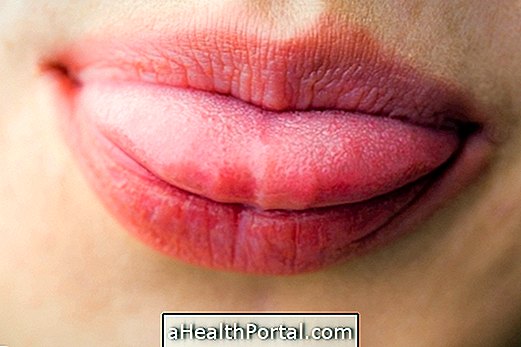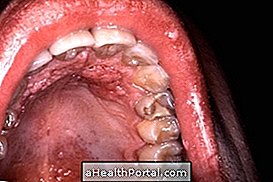Burning or burning sensation on the tongue is a relatively common symptom, especially after drinking a very hot drink such as hot coffee or milk, which ends up burning the lining of the tongue. However, this symptom may also arise for no apparent reason, and may indicate a health problem such as nutritional deficiency, mouth irritation or just indicate a dry mouth syndrome, for example.
Thus, whenever the tongue burns suddenly and takes more than 2 to 3 days to disappear, it is advisable to consult a dentist or even a general practitioner to evaluate the oral cavity and identify the cause, initiating the most appropriate treatment.

1. Eating hot foods or drinks
This is the main cause of tongue burning that arises in almost all people, at least once in a lifetime. Burning arises because if you ingest something very hot, the temperature can end up causing a burn in the tongue, lips, gums or cheeks. Most of the time, this burn is mild, but it can cause discomfort and loss of sensation for up to 3 days.
- What to do : To relieve symptoms you should give preference to cold foods and drinks, leaving food warmer for after symptoms disappear. So a good technique is to let the food cool before eating, for example. In addition, good oral hygiene should be maintained and, if the burn is very severe, consult a general practitioner.
2. Dry mouth
Dryness of the mouth arises when the salivary glands are unable to produce enough saliva to keep the oral mucosa and tongue moist. When this happens, it is normal to have a burning or tingling sensation on the tongue.
Some of the most frequent causes of dry mouth include problems in the salivary glands or use of some medications. In addition, hormonal changes, which are more common in women, can also cause dry mouth, so it is possible for some people to experience tongue burning at specific periods of life, such as during menstruation, for example. Know the main causes of dry mouth and what to do.
- What to do : When you feel a very dry mouth, you should increase water consumption or chew sugar-free gum, for example, to stimulate the production of saliva. However, when dryness persists for a long time, consult a general practitioner to identify the cause and initiate the most appropriate treatment.
3. Lack of vitamin B
The lack of vitamins of the B complex usually causes a slight inflammation of the oral mucosa, leading to the appearance of burning in the tongue, gums and cheeks. However, a lack of minerals such as iron and zinc can also cause the same type of symptoms.
This type of lack is more common in people who do not eat a varied diet or follow a more restricted lifestyle of food, such as vegetarians or vegans, for example. See which foods are richer in vitamin B, zinc or iron.
- What to do: the ideal is to always do a very varied diet, however, if there is a suspected deficiency of some vitamin should consult the doctor to do a blood test and initiate the necessary supplementation.

4. Fungal infection
Yeast infection, known as candidiasis, can also occur in the tongue, especially when you do not have proper oral hygiene. When this happens, it is common for the tongue to feel tingling or stinging, as well as other signs such as bad breath and whitish tongue. See other signs of oral candidiasis.
- What to do : usually the infection can be controlled with proper oral hygiene at least 2 times a day. However, if it does not go away within 1 week you should consult a dentist or general practitioner, as it may be necessary to use some antifungal to treat the infection.
5. Burning mouth syndrome
This is a relatively rare syndrome in which the burning sensation in the tongue arises for no apparent reason and can last for several years. In addition, other signs such as tingling and taste disturbance may occur, especially affecting people over 60 years of age.
The causes of this syndrome are not yet known, but excessive stress, anxiety and depression appear to be factors that increase the risk of developing it.
- What to do : When suspecting this syndrome should consult a doctor to confirm the diagnosis and rule out other possibilities.
When to go to the doctor
Normally, tongue burning disappears in a short time, maintaining proper oral hygiene and ingesting at least 2 liters of water per day. However, it is advised to go to the doctor if:
- The stinging lasts for more than 1 week;
- There is difficulty eating;
- Other signs appear such as white plaques on the tongue, bleeding or severe stench.
In these cases, you should consult a dentist or a general practitioner, to identify the correct cause and start the most appropriate treatment.
See also what can cause pain in the tongue and what to do.



















